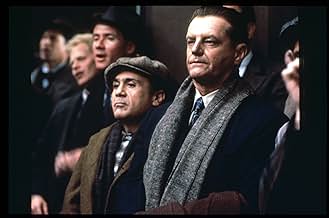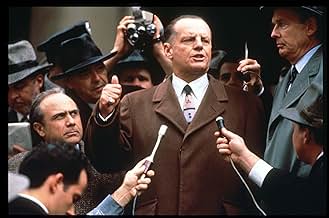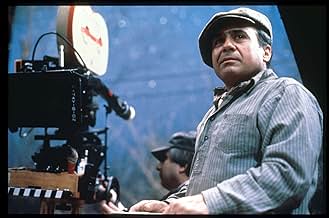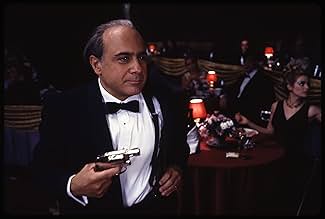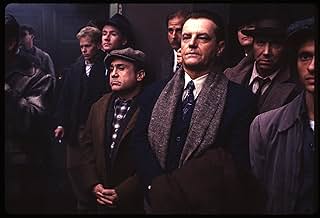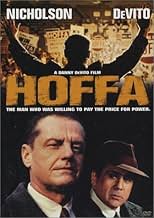AVALIAÇÃO DA IMDb
6,6/10
26 mil
SUA AVALIAÇÃO
A história da famosa figura da união americana Jimmy Hoffa, que organiza greves, lida com membros do sindicato do crime organizado e desaparece misteriosamente em 1975.A história da famosa figura da união americana Jimmy Hoffa, que organiza greves, lida com membros do sindicato do crime organizado e desaparece misteriosamente em 1975.A história da famosa figura da união americana Jimmy Hoffa, que organiza greves, lida com membros do sindicato do crime organizado e desaparece misteriosamente em 1975.
- Indicado a 2 Oscars
- 2 vitórias e 6 indicações no total
Joe Greco
- Loading Foreman
- (as Joe V. Greco)
Avaliações em destaque
James Riddle Hoffa was probably one of the most enigmatic union leaders in this history of our country. As an important labor organizer during the over the road trucker strikes in the 1930s, he accomplished many things that made possible the emergence of the Teamsters Union as a major political force for several decades afterward. At the same time, he fell into a trap that bedevils many a fighter who perceives her/himself as a "people's champion"- he convinced himself that he had to fight fire with fire, and in the end, it devoured him. Secondly, Hoffa did not have the money, the support or the political sophistication of a Robert Kennedy. This'll finish you in the United States. Despite all our bombast about law and order, the country loves its shady political characters charming and slick, or the medicine show man, witness: Clinton, Reagan, Bush. The awkward and openly coarse need not apply, witness Nixon, Hoffa, Lott. David Mamet understands that, and that's why his version of Hoffa's life works.
Mamet's Hoffa knows the Kennedy family built their fortune out of rum running to a large extent, and he sees no difference between their corruption and his own compromises. At least, Hoffa tells himself, his own deals with the devil serve something larger then his immediate family, they serve the membership of the union. And this was very true, which is why a fair number of Teamsters still swear by the name Jimmy Hoffa. Nicholson's snide asides to his "betters" completely captures the class war basis that motivated the actual man's actions. Anyone who has been through an actual labor dispute and has been witness to the patronizing communications that come through a company eager to crush a union effort knows full well what fired up Jimmy Hoffa, even as we turn aside from the path he took.
The film succeeds because De Vito, Nicholson and Mamet understand what pushed the labor movement forward, and they understand its contradictions. Most important, they understand why those contradictions overwhelmed a man as gifted as Jimmy Hoffa, and this is what makes it better then your average Hollywood drama about labor. Hoffa is a film about working class attitude that gets beneath the usual dismissals of working class concerns, and as such, deserves respect. The powers that be have every legend about their leadership. It's time the working class was allowed legends about its own once again, provided we understand that they are legends, and therefore laden with much myth. The very real larger then life qualities of Jimmy Hoffa, however, make this a film worth more then one critical glance.
Mamet's Hoffa knows the Kennedy family built their fortune out of rum running to a large extent, and he sees no difference between their corruption and his own compromises. At least, Hoffa tells himself, his own deals with the devil serve something larger then his immediate family, they serve the membership of the union. And this was very true, which is why a fair number of Teamsters still swear by the name Jimmy Hoffa. Nicholson's snide asides to his "betters" completely captures the class war basis that motivated the actual man's actions. Anyone who has been through an actual labor dispute and has been witness to the patronizing communications that come through a company eager to crush a union effort knows full well what fired up Jimmy Hoffa, even as we turn aside from the path he took.
The film succeeds because De Vito, Nicholson and Mamet understand what pushed the labor movement forward, and they understand its contradictions. Most important, they understand why those contradictions overwhelmed a man as gifted as Jimmy Hoffa, and this is what makes it better then your average Hollywood drama about labor. Hoffa is a film about working class attitude that gets beneath the usual dismissals of working class concerns, and as such, deserves respect. The powers that be have every legend about their leadership. It's time the working class was allowed legends about its own once again, provided we understand that they are legends, and therefore laden with much myth. The very real larger then life qualities of Jimmy Hoffa, however, make this a film worth more then one critical glance.
Possibly Jack Nicholson was showing up nominated at to many award shows at this time and he was due for a put down.The movie seemed to be overlooked or not reviewed very well at the time of release. I thought his "Hoffa" was a memorable portrayal of a complex and contradictory personality. Having been around during Hoffa's reign as head of the Teamsters, as well as being a Teamster back then myself, Nicholson's potrayal was uncanny in it's grasp of Hoffa's style and personality. Nicholson seemed to get in Hoffa's skin for this role as George C. Scott did for Patton. As a matter of fact I think the analogy is accurate. Both Patton and Hoffa were contoversial, larger the life characters with a lot of flaws and a lot of attributes. Both actors were highly skilled and balanced in their potrayals.
Life made him famous, but death turned him into a legend. If it weren't for his mysterious disappearance probably due to his connections with the mob, it's doubtful that Jimmy Hoffa, the leader of the most powerful union would have been such a deeply rooted figure in American pop-culture. This posthumous place among the unsolved mysteries of the last century was begging for a movie adaptation, and Danny DeVito's turned into quite an interesting biopic, but strangely enough, it says a lot about the man without saying that much. At the end of the film, I knew some of his achievements, but the motives, the traumas, the obsessions, what makes a character fascinating, were still a mystery.
This is not to belittle the film's educational value, but I don't think such a complex public figure can be understood if we don't even have some quick glimpses about his past, his background and his family. It's as if Danny DeVito sticked with the public image of Hoffa and didn't give us enough to hook our hearts on outside the Teamster business, which is a pity because Jack Nicholson made the character and gave him such an aura that it genuinely made me curious about the man. Yet, nothing is shared except what he tells his friends, the mob, the journalists, and Bobby Kennedy. I was begging for an intimate moment with his wife, not because "behind every great men, there's a woman" but because men do confess to their wives, share with them the off-the-record stuff, but "Hoffa" is not in the same caliber than, say, Oliver Stone's "Nixon", which is about a no less controversial figure. And I guess I wasn't surprised because I saw the wife in the middle of the film but because she was showed while she was useless plot-wise.
On the other hand, the film tackles its subject in a very serious and entertaining way that I'm asking myself if DeVito or the screenwriters did have enough material to approach the privacy of Hoffa, maybe they didn't, or maybe they had but they didn't have enough time. The film is more trying to answer to the question of Hoffa's whacking than the typical rise and fall, it's more about the way he became an instrument of the mob with a pragmatic view on the ends- justifies-the mean theory, but we never see how effective they are for the Teamsters. I learned more about the rights and the struggle of truck drivers from the underrated film-noir "They Drive by Night" or the thriller "Wages of Fear" than "Hoffa", which is saying a lot because it had to be about trucks too, Ebert said that DeVito showed a man who was all about trucks, he talked and breathed 'truck', well how about showing these trucks in the first place? The film fails providing insights on the character by focusing too much on the controversy; it doesn't help to get enough perspective. Imagine if "Nixon" was only about the Watergate, you wouldn't have known about Nixon AND the Watergate either, DeVito's film lacked focus and scope.
It's interesting that the film was made in 1992, the same year than another and better biopic, Spike Lee's "Malcolm X", the film is three-hour long but takes you from the roots of the leader, when he was a small-time crook to his rise as one charismatic orator. In "Hoffa", we never see him driving a truck, nourishing his heart with socialist ideas and revolting against the system. From the beginning, he's like a politician haranguing the comrades. I take it from granted than what he say is true, but it's not about belief, but empathy, the film is not about making Hoffa a good or a bad guy, but letting the viewer figuring out. If he was bad enough (in the "practical" meaning) to stick with the gangsters when he became powerful, it would be interesting to see how he started as an idealistic man, and it would make the corruption of his morality more interesting. That's what great biopics are about: evolutions, and never in "Hoffa", do we feel that the guy is changing, in bad or good, it doesn't matter, but there's no dynamics whatsoever.
And again, it's a pity because the performances are good, I can't believe Nicholson got a Razzie nomination for this, granted it wasn't the best of his career, but he did bring some energy and passion in the character. But what lacked was a structure, a right choice of episodes that would tell us something about a controversial figure. The film is two-hour and fifteen minutes long, I wouldn't have minded it being much longer if it could enlighten me on the private face of Jimmy Hoffa, we're talking about a character played by Nicholson, who's got a great chemistry with his real-life friend Danny DeVito, the film had the potential, the ambition, probably the budget, the writing was good, but the storytelling not so.
Still, for what it is, it's not wasted time, and the film has a solid consistency in it, and at least, it does something that almost redeems the flaws I mentioned: it ends with the best scene, the most memorable one. In terms of shock and emotion, even though we know the story of Jimmy Hoffa, we don't see the ending coming, and it did left me puzzled and shocked when I saw it for the first time. The film needed more moments like this, but all in all, it's a solid drama.
This is not to belittle the film's educational value, but I don't think such a complex public figure can be understood if we don't even have some quick glimpses about his past, his background and his family. It's as if Danny DeVito sticked with the public image of Hoffa and didn't give us enough to hook our hearts on outside the Teamster business, which is a pity because Jack Nicholson made the character and gave him such an aura that it genuinely made me curious about the man. Yet, nothing is shared except what he tells his friends, the mob, the journalists, and Bobby Kennedy. I was begging for an intimate moment with his wife, not because "behind every great men, there's a woman" but because men do confess to their wives, share with them the off-the-record stuff, but "Hoffa" is not in the same caliber than, say, Oliver Stone's "Nixon", which is about a no less controversial figure. And I guess I wasn't surprised because I saw the wife in the middle of the film but because she was showed while she was useless plot-wise.
On the other hand, the film tackles its subject in a very serious and entertaining way that I'm asking myself if DeVito or the screenwriters did have enough material to approach the privacy of Hoffa, maybe they didn't, or maybe they had but they didn't have enough time. The film is more trying to answer to the question of Hoffa's whacking than the typical rise and fall, it's more about the way he became an instrument of the mob with a pragmatic view on the ends- justifies-the mean theory, but we never see how effective they are for the Teamsters. I learned more about the rights and the struggle of truck drivers from the underrated film-noir "They Drive by Night" or the thriller "Wages of Fear" than "Hoffa", which is saying a lot because it had to be about trucks too, Ebert said that DeVito showed a man who was all about trucks, he talked and breathed 'truck', well how about showing these trucks in the first place? The film fails providing insights on the character by focusing too much on the controversy; it doesn't help to get enough perspective. Imagine if "Nixon" was only about the Watergate, you wouldn't have known about Nixon AND the Watergate either, DeVito's film lacked focus and scope.
It's interesting that the film was made in 1992, the same year than another and better biopic, Spike Lee's "Malcolm X", the film is three-hour long but takes you from the roots of the leader, when he was a small-time crook to his rise as one charismatic orator. In "Hoffa", we never see him driving a truck, nourishing his heart with socialist ideas and revolting against the system. From the beginning, he's like a politician haranguing the comrades. I take it from granted than what he say is true, but it's not about belief, but empathy, the film is not about making Hoffa a good or a bad guy, but letting the viewer figuring out. If he was bad enough (in the "practical" meaning) to stick with the gangsters when he became powerful, it would be interesting to see how he started as an idealistic man, and it would make the corruption of his morality more interesting. That's what great biopics are about: evolutions, and never in "Hoffa", do we feel that the guy is changing, in bad or good, it doesn't matter, but there's no dynamics whatsoever.
And again, it's a pity because the performances are good, I can't believe Nicholson got a Razzie nomination for this, granted it wasn't the best of his career, but he did bring some energy and passion in the character. But what lacked was a structure, a right choice of episodes that would tell us something about a controversial figure. The film is two-hour and fifteen minutes long, I wouldn't have minded it being much longer if it could enlighten me on the private face of Jimmy Hoffa, we're talking about a character played by Nicholson, who's got a great chemistry with his real-life friend Danny DeVito, the film had the potential, the ambition, probably the budget, the writing was good, but the storytelling not so.
Still, for what it is, it's not wasted time, and the film has a solid consistency in it, and at least, it does something that almost redeems the flaws I mentioned: it ends with the best scene, the most memorable one. In terms of shock and emotion, even though we know the story of Jimmy Hoffa, we don't see the ending coming, and it did left me puzzled and shocked when I saw it for the first time. The film needed more moments like this, but all in all, it's a solid drama.
I have no interest in the life of Jimmy Hoffa, and I am predisposed to disliking the man even before the first frame of Hoffa is run. But I do watch, knowing the film is from a very good David Mamet script, knowing that I want to be convinced that Jack Nicholson is one of our great actors, and knowing that Danny DeVito is a very serious filmmaker--that I will see his heart and soul in the film.
I am not disappointed, and I still care, not at all about James Hoffa, the man.
Jack Nicholson is one of our great actors, and regardless of all his extra curricular activities, he is a committed and serious craftsman, and his portrayal of James Hoffa is fine craftsmanship.
The story of Hoffa itself may be the least interesting component of the film. The production design is beautiful-a perfect compliment to the words of Mamet delivered by a painstakingly perfect cast.
Should you have the opportunity to view the deluxe laserdisk with the Danny Devito commentary and extra production materials you will be treated.
Not a film for everyone, but I liked it.
I am not disappointed, and I still care, not at all about James Hoffa, the man.
Jack Nicholson is one of our great actors, and regardless of all his extra curricular activities, he is a committed and serious craftsman, and his portrayal of James Hoffa is fine craftsmanship.
The story of Hoffa itself may be the least interesting component of the film. The production design is beautiful-a perfect compliment to the words of Mamet delivered by a painstakingly perfect cast.
Should you have the opportunity to view the deluxe laserdisk with the Danny Devito commentary and extra production materials you will be treated.
Not a film for everyone, but I liked it.
A film based on the story of legendary union figure Jimmy Hoffa (played here by Jack Nicholson).
Can I first say this was strange casting for Bobby Kennedy? It just seems like someone doing a very poor Kennedy impersonation, not a serious attempt to really capture him. Which is unfortunate, given how central his role is. (This film, more than anything, seems to be Hoffa versus Kennedy.) The Nicholson casting is not perfect, either, because it is hard to hide his distinctive voice... but I think he pulls it off ,and the makeup helps.
The Hoffa story is a fascinating one, and one that deserves to be explored on film again. This was 1992, and I write this in 2015. In the past two decades, more memoirs have been written, more government documents released... we need another biopic, and maybe a really serious documentary?
Can I first say this was strange casting for Bobby Kennedy? It just seems like someone doing a very poor Kennedy impersonation, not a serious attempt to really capture him. Which is unfortunate, given how central his role is. (This film, more than anything, seems to be Hoffa versus Kennedy.) The Nicholson casting is not perfect, either, because it is hard to hide his distinctive voice... but I think he pulls it off ,and the makeup helps.
The Hoffa story is a fascinating one, and one that deserves to be explored on film again. This was 1992, and I write this in 2015. In the past two decades, more memoirs have been written, more government documents released... we need another biopic, and maybe a really serious documentary?
Você sabia?
- CuriosidadesThe only major make-up Jack Nicholson had to wear to become Jimmy Hoffa was fake nose and a set of false upper teeth (as seen in the behind-the-scenes footage on the DVD).
- Erros de gravaçãoWhen Jimmy and Billy torch bomb the building, they create a blast so intense, it blows out the passenger side window on Bobby's truck. Yet in the following shots, the window goes from being intact, to being shattered.
- Citações
Jimmy Hoffa: If a guy's close to you, you can't slight 'im. You can't slight that guy. A real grievance can be resolved; differences can be resolved. But an imaginary hurt, a slight - that motherfucker gonna hate you 'til the day he dies.
- Cenas durante ou pós-créditosthere are no opening credits and the title of the film at the beginning.
- Versões alternativasOn a special laserdisc edition, Danny DeVito hosts a supplemental portion of the disc with outtakes, including a scene where Hoffa perfectly shoots a beer bottle with a rifle.
- Trilhas sonorasLet's Make Love Tonight
Written, Produced and Performed by Nicky Addeo
Principais escolhas
Faça login para avaliar e ver a lista de recomendações personalizadas
- How long is Hoffa?Fornecido pela Alexa
Detalhes
Bilheteria
- Orçamento
- US$ 35.000.000 (estimativa)
- Faturamento bruto nos EUA e Canadá
- US$ 24.276.506
- Fim de semana de estreia nos EUA e Canadá
- US$ 6.406.012
- 27 de dez. de 1992
- Faturamento bruto mundial
- US$ 29.302.121
- Tempo de duração
- 2 h 20 min(140 min)
- Cor
- Proporção
- 2.39 : 1
Contribua para esta página
Sugerir uma alteração ou adicionar conteúdo ausente



